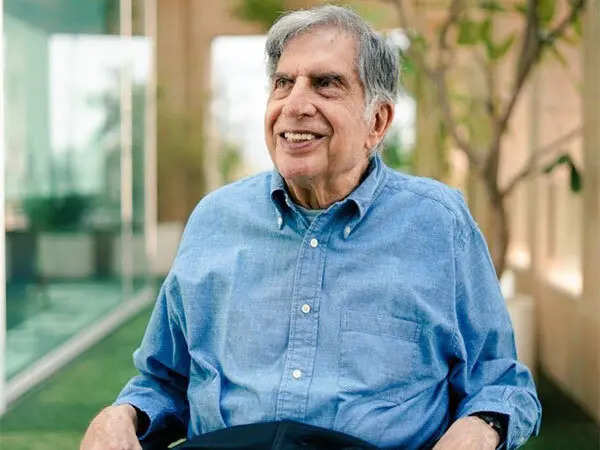[ad_1]

BY: Amol Dethe
Ratan Naval Tata, one of India’s most revered industrialists and a paragon of leadership, passed away at the age of 86. His demise marks the close of a remarkable chapter in the annals of global business. A towering figure in Indian industry, Tata was a man of quiet dignity, profound foresight, and a deep-rooted sense of social responsibility.
A storied beginning
Born in Mumbai (then Bombay) on December 28, 1937, into the illustrious Tata family, Ratan Tata was destined for a life of significance. Yet, his rise to prominence was never one of mere inheritance. Raised by his grandmother, Lady Navajbai Tata, in the aftermath of his parents’ separation, Tata grew up with an understated sense of duty that would shape his approach to life and business.
He was educated at the Cathedral and John Connon School in Mumbai before journeying abroad to complete his degree in architecture from Cornell University in 1962. It was here that Tata first developed a passion for design—an inclination that would later influence some of his most iconic business ventures. He further honed his managerial acumen at Harvard Business School, completing the Advanced Management Program in 1975.
A reluctant leader who transformed the Tata Group
Ratan Tata’s early years at the Tata Group were characterised by a deliberate avoidance of any overt reliance on his family name. He began his career on the shop floor at Tata Steel, where he worked alongside blue-collar laborers, learning the business from the ground up. This humility and hands-on experience would define his approach to leadership in the years to come.
When Tata assumed leadership of the Tata Group in 1991, he inherited an empire steeped in legacy but in need of reinvention. What followed was nothing short of a corporate renaissance. During his two-decade tenure as chairman, Tata transformed the sprawling conglomerate from a predominantly India-focused entity into a global enterprise. Under his stewardship, the Group expanded into over 100 countries, with nearly two-thirds of its revenue generated from outside India.
Key achievements
Among Tata’s most notable accomplishments were his bold acquisitions of international brands, a testament to his vision of making the Tata Group a global player. The acquisition of Tetley Tea in 2000 marked the first significant overseas purchase by an Indian company, setting the tone for what was to come. The group went on to acquire the UK’s Corus Steel in 2007 and the iconic Jaguar Land Rover in 2008, moves that were initially met with skepticism but ultimately underscored Tata’s far-reaching foresight.
One of Tata’s most audacious initiatives, however, was the Tata Nano—a car designed to offer mobility to the masses at an affordable price. Launched in 2008, the Nano was a manifestation of Tata’s belief that business must serve society. While commercially less successful than anticipated, the project nonetheless earned Tata international recognition as a visionary entrepreneur who sought to bridge the gap between aspiration and accessibility.
A life of philanthropy and purpose
Beyond business, Ratan Tata was deeply committed to philanthropy, a legacy that traces its roots to the founding principles of the Tata family. As chairman of the Tata Trusts—one of India’s oldest and most significant charitable organizations—he oversaw substantial investments in areas such as healthcare, education, and rural development. His personal dedication to these causes extended beyond mere financial contributions; Tata was an advocate for using wealth as a tool for societal improvement, often working quietly behind the scenes to advance causes close to his heart.
His philanthropic endeavors were as transformative as his business successes. Tata was instrumental in the establishment of numerous educational institutions, scholarships, and healthcare initiatives, helping countless individuals across the country. His legacy in this regard is profound—ensuring that the fruits of his success were shared widely and meaningfully.
Controversies and challenges
While Ratan Tata was lauded for his integrity and vision, his journey was not without its share of challenges and controversies. The acquisition of Corus Steel, though eventually successful, was heavily criticised for its timing and cost, particularly as the global economy began to falter soon after. The Tata Nano project, though groundbreaking in its ambition, faced several production delays and did not live up to its commercial promise, prompting some to question whether it was ahead of its time.
The most public controversy of Tata’s career came in 2016, when his successor, Cyrus Mistry, was ousted as chairman of Tata Sons. The legal battle that ensued raised questions about governance within the group, putting Tata in the unfamiliar position of being at the center of public scrutiny. Yet, through it all, Tata maintained a characteristic stoicism, choosing to defend the values and ethics of the group while refraining from descending into personal attacks.
A legacy of grace and dignity
Perhaps the most defining trait of Ratan Tata’s leadership was his unwavering adherence to ethical principles. In an era marked by corporate greed and misconduct, Tata was a beacon of integrity. He famously declined a bribe when his company was bidding to start an airline, underscoring his belief that profits should never come at the expense of one’s principles.
Tata’s retirement in 2012 marked the end of an era for the conglomerate, but his influence remained palpable. He continued to mentor young entrepreneurs, offering guidance and support to India’s burgeoning startup ecosystem. His investment in several Indian startups—including Ola and Paytm—demonstrated his continued belief in the power of innovation to drive progress.
Tata leaves behind a legacy that transcends the corporate world. His vision, compassion, and relentless pursuit of excellence have left an indelible mark on India and the world. His life is a testament to the belief that business, when conducted with integrity, can be a force for good.
[ad_2]
Source link











